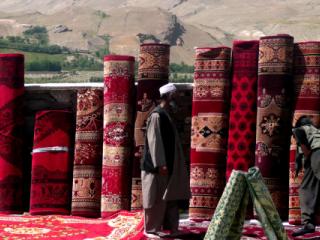To unpack the history of African musical migration, you have to go back to European colonization, says musicologist Ron Radano. He's been rewriting the history of race and Black music, and he says, "We are all African when we listen."More
Interviews By Topic
Afghan women are complicated. They pray, have affairs, and get mad at their children. But it seems one thing binds them — the landay. Poet and journalist Eliza Griswold went to Afghanistan in 2012 learn more about a type of poem that Afghan women have been sharing since 1700 BCE.More
Anna Badkhen spent a year in the remote Afghan village of Oqa. She got to know the master weavers, who make some of the world's most beautiful carpets.More
In the midst of chaos in her home country, Humaira Ghilzai recently sat down with Charles Monroe-Kane to talk about what might be lost culturally as the Taliban take power.More
In her book, "Against White Feminism," Pakistani Rafia Zakaria argues that white American feminists prolonged the bloodshed during the 20 year war in Afghanistan. She asks if these feminists ever asked Afghan women of the region what they wanted.More
Albert Camus’s first novel, "The Stranger," speaks strongly to the search for meaning. It’s the story of an alienated man who commits a senseless murder. Literary critic Alice Kaplan calls it "the perfect Black Lives Matter book."More
Science writer Deborah Blum on the government scientists who made the case for food regulation by "eating dangerously."More
Tyrone Muhammad, also known as "Muhammad the Mortician," is the funeral director at Newark’s Peace and Glory Home for Funerals. He spent decades trying to stop the epidemic of gun violence in the black community he serves, but nothing prepared him for a pandemic.More
David Kessler is one of the foremost experts on death and grieving. He’s written many books on the subject, and worked with Elizabeth Kubler Ross on famous five stages of grief. He recently added a sixth: finding meaning.More
The poet Nikki Giovanni, reading her poem "One Ounce of Truth Benefits Like a Ripple on a Pond."More
Suzanne O’Sullivan on what medical science is missing about mysterious illnesses. More
Philosopher John Kaag discusses how the 19th century thinker William James might help us seek meaning and purpose in a confusing time.More
One of Charles’ favorite musician interviews is with country music star Brandy Clark. Brandy and Charles have a similar upbringing and he had a strong connection with her album “Big Day in a Small Town.”More
With "Broadcast From Home," New York City composer and musician Lisa Bielawa hopes to set the thoughts and emotions of quarantine to music, in the voices of anyone willing to contribute a performance. More
David Shields says the New York Times is complicit in romanticizing war through imagery.More
Is war inevitable? Leymah Gbowee loudly and strongly says no. And she’s got proof.More
James Nachtwey is one of the world's great war photographers. For more than three decades, he's covered just about every major armed conflict around the world, and he's been wounded several times on the job. He talks about his harrowing work in Afghanistan, Iraq and where those wars began — Ground Zero in 2001.More
Alissa Quart spent the last few years traveling around the country, talking with all kinds of people about work. What she found is a lot of people with jobs that look good on paper but who feel — in a word — squeezed.More

















